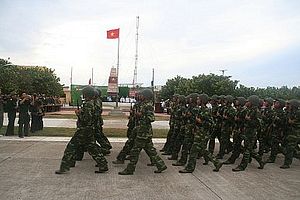Last week, Vietnam and France inked a new joint vision statement. The move, which came amid the visit of Vietnam’s defense minister to France, represents yet another step forward in the growing defense ties between the two countries during an important year in spite of the challenges that remain.
As I have noted before in these pages, France and Vietnam have a long historical relationship that dates back to Vietnam’s status as a French colony through the formalization of contemporary ties in 1973 and then the upgrading of ties to the level of a strategic partnership in 2013. Defense ties have advanced as part of this as well, with both sides signing a defense cooperation pact in 2009 and then making progress subsequently on various fronts, from increasing exchanges to facilitating collaboration in areas like peacekeeping and military medicine.
Yet both sides have been looking to advance ties, including on the defense side, still further. 2018 represents a good opportunity to do so as it is a key symbolic year for ties, being both the 45th anniversary of the establishment of diplomatic ties and the fifth anniversary of the inking of the strategic partnership. Unsurprisingly, we have seen a series of notable events tied to this symbolic year, from defense-specific developments such as the first visit of a French air squadron in August to more general ones such as the March visit of Nguyen Phu Trong, the general secretary of the Vietnamese Communist Party, to France, which constituted the highest-level meeting between the two sides since French President Emannuel Macron came to power.
Last week, the defense aspect of relationship was in the headlines again with another notably development: the visit of Defense Minister Ngo Xuan Lich to France. The planned trip occurred from September 15 to 20 and was officially at the invitation of the French Minister of the Armed Forces Florence Parly.
During his visit, Lich and his accompanying delegation met a range of French officials including Parly, visited some French defense facilities, and held sideline events to boost collaboration in several areas in the defense relationship. There were also a series of interactions that occurred tied to Lich’s visit, including the holding of the first Vietnam-France deputy ministerial dialogue on security and defense strategy on September 18, and the revising of the initial defense cooperation agreement inked in 2009.
The headline item on the defense side was the signing of the joint vision statement on defense cooperation. As is the case with such documents Vietnam signs with key partners, the statement formalizes the areas of collaboration the two sides would undertake during a particular period lasting out to 2028, with a potential renewal coming thereafter.
Unsurprisingly, few details were unveiled as to the specific contents of the joint vision statement. Vietnam’s defense ministry only noted that the joint vision statement covered avenues that both sides have already been exploring potential collaboration in, be it aspects of ties including exchanges, training, exercises, defense industry; issue areas like military medicine, peacekeeping operations, and maritime security; or other regional and international issues of mutual interest.
Speaking to the significance of the statement, Lich said that the move represented how defense ties would be taking a new step forward in line with the strategic partnership, and that this would be beneficial not only for both countries, but the region more generally. While the joint vision statement certainly represents progress in that direction, the extent to which the two countries are able to achieve this will depend on their ability to both maximize opportunities that lie ahead and minimize challenges that remain.
































